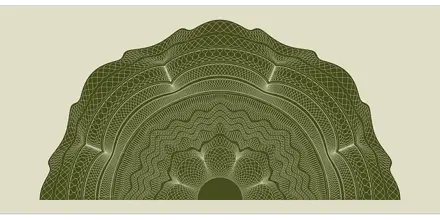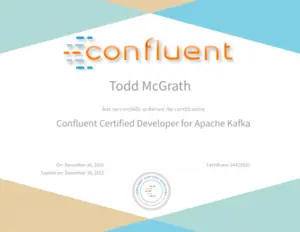If you are considering Kafka Certification, this page describes what I did to pass the Confluent Certified Developer for Apache Kafka Certification exam.
You may see it shortened to “ccdak confluent certified developer for apache kafka tests“.
Good luck and hopefully this page is helpful for you!
There are many reasons why you may wish to become Kafka certified.
Achieving Kafka Certification might be a way to distinguish yourself in your current role. Or, you may wish to transition to a new role which includes a higher bill rate for Kafka contract work. Or, you may just like the pressure of testing yourself and your Kafka developer chops. Whatever your reasons, it doesn’t matter here folks. We are all equal under the stars in the sky. Well, I’m not exactly sure that’s true about all being equal, but it sounds pretty good, right? Sometimes, when you are Kafka certified, you need to sound good when you are speaking and writing. Pfft…lol, anyhow, let’s get serious.
I achieved the Kafka Developer certification through hard work. I had a couple of years of Kafka experience, but this experience wasn’t ever really solely focused on Kafka. Kafka was just a component in the overall stack I needed and/or wanted to utilize. It was never 100% devoted to Kafka though. Along the way, I wrote some Kafka tutorial blog posts here to help engrain some of my Kafka learnings.
My point is I had some Kafka experience. And if I’m being honest, I had misconceptions about what Kafka is and is not at times. If I’m being entirely honest, I still do sometimes. You see, I’m honest.
Here’s a link to my certification
With my previously described experience with Kafka in mind, I took the following steps to pass the certification test on my first try. Consider these my personal Kafka Certification tips and FAQ.
Table of Contents
- What is Kafka Certification?
- Are there multiple types of Kafka Certification?
- What should you study to become Apache Kafka Certified?
- What is the percentage breakout of questions on Kafka vs. Kafka Streams, etc?
- Are there any Kafka Certification practice tests?
- How did you prepare for the exam?
- Please describe the “proctor” experience?
- Any Kafka Developer Certification sample questions you can share?
- Anything you didn’t do to prepare, but considered doing?
- Final Thoughts or any other helpful resources
What is Kafka Certification?
Kafka Certification is a program through Confluent and at the time of this writing, there are two available certifications. The Confluent Certified Developer for Apache Kafka (CCDAK) and the Confluent Certified Operator for Apache Kafka (CCOAK). To become certified, you must take a remotely proctored exam from your computer. Does anyone else think “remotely proctored” sounds a bit…. well, odd.
Are there multiple types of Kafka Certification?
Yes. This post, certification suggestions, and descriptions focus on the Kafka Developer certification.
What should you study to become Apache Kafka Certified?
Well, first off, you should be prepared for more than just Kafka, the distributed commit log, Consumers and Producers. This is what most people think of when they hear Kafka. The exam will also test your knowledge in areas such as Kafka Connect, Kafka Streams, KSQL and the Schema Registry. I cover this in more detail in the next questions.
What is the percentage breakout of questions on Kafka vs. Kafka Streams, etc?
According to the developer’s certification guide from Confluent (at the time of this writing), we are given the following guidance on the breakout.
Application Design 40% which includes command-line tools, configuration, metrics, architecture, and design
Development 30% which is focused on Java Consumer and Producer APIs as well as the REST API
Deployment/Testing/Monitoring 30% includes tuning for latency/throughput, Kafka Streams, KSQL and troubleshooting
This percentage breakout is taken directly from the Confluent Certification Guide. There is a link to this Guide in the Resources section below.
Are there any Kafka Certification practice tests?
Yes and I purchased a Kafka Certification practice exam course on Udemy and it helped. It includes 3 sets of practice tests.
How did you prepare for the exam?
I started by reading documentation and performing some hands-on examples from both the Apache Kafka and Confluent documentation. I read these Kafka docs pretty quickly at first because I wanted to obtain the big picture view of my skills.
Next, I took the first set of practice questions from the practice tests course I purchased. The results of this first practice test showed where I was strong and where I was weak.
Next, I went back to both the Apache Kafka and Confluent documentation and read more carefully in the areas where I needed improvement.
Afterward, I took the 2nd practice test with higher expectations this time. Again, the results provided an updated assessment of my current Kafka skills and showed me my weaknesses. This time, I studied where I was weak again. But, I also spent 10-20% of the time in areas where I already felt confident.
By now, I imagine you can guess what I did next. I took the third series in the practice exam set.
At this point, I was feeling pretty confident, so I scheduled my test and began studying the documentation again for 30min to 1 hour a day for each day before the exam.
Please describe the “proctor” experience?
Well, let me tell you they are not kidding about wanting to view the area where you take the test. I had to spin my webcam 360 degrees. The proctor asked questions about my dual monitor setup and was quite concerned. I had to disconnect my second monitor and external camera.
Any Kafka Developer Certification sample questions you can share?
Well, the Confluent Certification guide contains a few sample questions, but from my personal experience, I’d buy the recommended practice exam questions I mentioned above and below.
Anything you didn’t do to prepare, but considered doing?
I kept it simple. I didn’t buy any courses from Udemy or Pluralsight, but I admit I was tempted to buy. Instead, I just purchased the practice exams and studied the Apache Kafka and Confluent documentation. I was tempted to, but the documentation is good and there are plenty of examples on the Internet. According to Steven Pressfield, I just needed to “do the work”.
Final Thoughts or any other helpful resources
- https://confluent.io/certification
- Kafka Certification Guide from Confluent (PDF) https://cdn.confluent.io/wp-content/uploads/CCDAF.pdf
- The Kafka Practice Exams I purchased
Featured image https://pixabay.com/users/insspirito-1851261/


